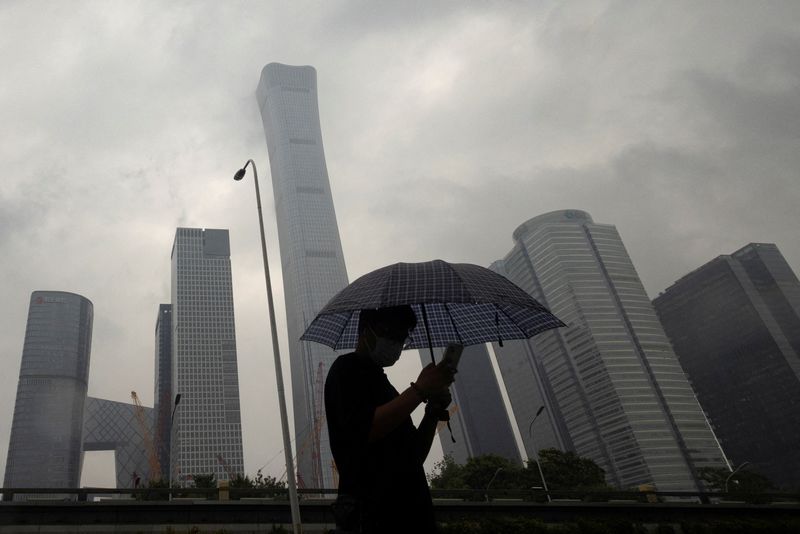
©Reuters. A man walks in the central business district on a rainy day, in Beijing, China, July 12, 2023. REUTERS/Thomas Peter/File Photo
By Nicoco Chan
HONG KONG (Reuters) – Faced with declining job prospects due to the economic slowdown, Chu Yi is choosing to “lie down”, a Chinese term used to describe people who work just enough to afford to devote their time to that he likes.
The 23-year-old Shanghai resident worked at a fashion company, but said she quit her job two years ago because she often had to work overtime and hated her boss.
Chu now works from home just one day a week for a travel agency, which gives her plenty of time to practice tattooing as part of a six-month apprenticeship to become a full-time tattoo artist.
And it’s not the only one “flattening”: While there’s no data on how many young Chinese are giving up corporate jobs they traditionally would have taken, the youth unemployment rate rose to a record high of 21.3% in June 2023 amid an economy still struggling to return to pre-pandemic levels of growth, and several Chinese graduates have said they are moving down to find a source of income.
“For me, it doesn’t mean much to work,” Chu said. “Most of it seems to get the job done for your manager and make him happy. So I’ve decided I don’t want to work.”
There are around 280 million young Chinese who, like Chu, were born between 1995 and 2010, and surveys show that this generation Z is the most pessimistic of all the age groups in the country.
Pacifying this generation amid some of the slowest economic growth in nearly half a century represents a key policy challenge for Chinese President Xi Jinping, and last month the human resources ministry said more efforts were needed to support employment in 2024, especially for young people.
Zhou Yun, assistant professor of sociology at the University of Michigan, said that while it may appear that some young people are giving up on the corporate rat race, it is impossible to overlook their pessimism about the future.
As China’s economy slows and the job market remains tight, it is “profoundly difficult for young people to navigate stark social inequalities, tightening political control and poor economic prospects,” Zhou said.
All of this combined is causing young people like Chu to prioritize their own well-being and interests over what she calls the “endless pressure” of corporate work. Chu said she was much happier now and she believed her choice was “useful.”
“My current salary, although not much, is enough to cover my daily expenses. Free time is worth much more than several thousand yuan,” he said.